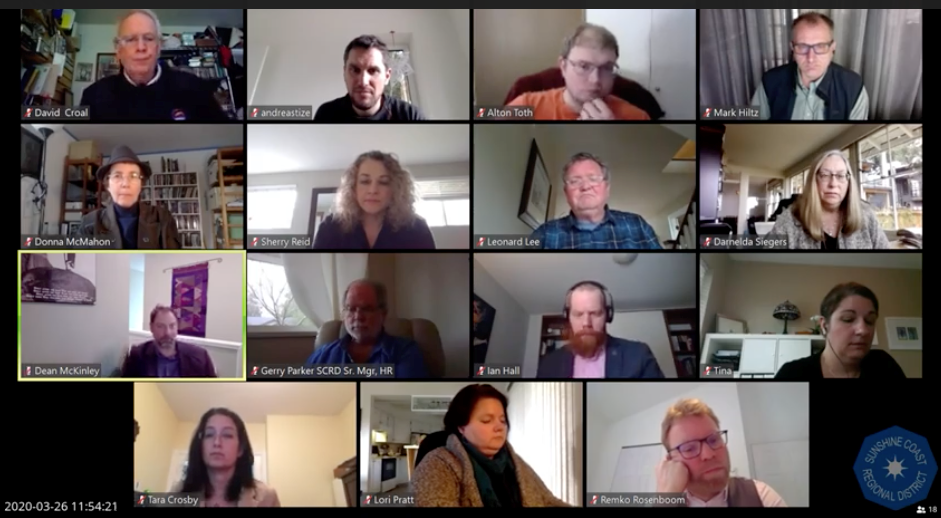Two weeks ago, Sunshine Coast Regional District (SCRD) directors adopted a controversial $73-million budget. Now, in light of what Sechelt director Darnelda Siegers described as an “unprecedented change in the community,” directors are contemplating cracking it back open and cutting it down to size.
“[There’s been a] huge impact to businesses, to residents, and so there is a request to say what can we do, given our budget actually passed, and all the projects in that budget we firmly believe are necessary to move forward,” said Siegers during a corporate and administrative services committee meeting on March 26.
If they do make changes and want to reduce taxes, time is of the essence. Amendments to the financial plan must be made by April 1, since the SCRD sends tax requisitions to the province shortly after that deadline, according to chief financial officer Tina Perreault.
The overall tax increase this year is 12.9 per cent. Parcel taxes and user fees to pay for the regional water system have increased by 25 per cent.
Staff noted that many jurisdictions are looking at making budget changes, but as of March 26, they hadn’t received word yet from the province on whether deadlines could be relaxed, given the crisis.
An emergency board meeting has been scheduled for Monday, March 30 at 9:30 a.m., chief administrative officer Dean McKinley confirmed Friday.
To start things off at the committee meeting, Perreault provided a breakdown of where changes might be made, if directors decide to amend the budget.
There are approximately $808,000 worth of tax-funded projects in the 2020 budget, said Perreault, and senior leadership is reviewing these lists to establish the implications for deferring projects at least a year. Of those, she described a $175,000 study to look at waste disposal options for when the landfill closes and a $200,000 project to fix the ground disturbance at the landfill as “quite critical to the organization.”
She also addressed the new staffing positions approved in the budget. More analysis was needed, since they aren’t entirely funded through taxes, and because some staff are already working. “We would have to better understand the changes to service delivery,” she said. Approximately $661,000 of those positions are tax funded.
Staff also looked at deferring annual contributions to capital and operating reserves, many of which are tied to asset renewal plans, but that could also have an impact on services. Spending operating reserves on projects is another option, said Perreault, since policy indicates that they could be used to “potentially mitigate some of the taxation for this year.”
A final piece is the Emergency Operations Centre, which has been operating as a result of the COVID-19 crisis. Currently there are no financial implications, but if it operates long term, the SCRD may need to borrow money to run it as costs add up, which would require a financial plan amendment. It’s also a widespread issue in the province, said Perreault.
Making budget amendments particularly tricky for the regional district is that money prescribed for one service can’t be used for another.
Roberts Creek director Andreas Tize asked whether it was worth amending the budget to reduce taxes to reflect the fact that recreational facilities are closed and because other services have been reduced. “To me it doesn’t make a whole lot of sense to be accruing a whole bunch of reserves throughout this year when people are short on cash.”
Perreault said senior leadership is looking into it, adding that user rates and parcel taxes, which cover water and wastewater, will be harder to change, since the bylaws have already been adopted, utilities are about to be issued, and the funds are tied to projects. “That’s sort of an essential service, to deliver water,” she said.
One budget-related decision directors did make, however, was to defer awarding a $239,980 contract to Integrated Sustainability Consultants Ltd. for Phase 4 of the raw water feasibility study.
That phase would see design and cost estimates for Site B updated, among other things. The project is currently estimated at $53 million.
Elphinstone director Donna McMahon, who opposes the project, suggested the contract be nixed altogether, citing COVID-19. “Faced with the pandemic and worldwide financial crash that we’re in right now, I really feel that we need to revisit all of our spending and prioritize. This is something I think we can shelve.”
Rather than cancel the contract, directors voted to defer the decision to a future board meeting, and asked staff to explain the implications if they decide to amend the project.



